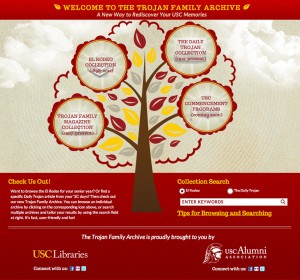USC Libraries digitizes all student publications
The home page to the new Trojan Family Archive, a collaboration between the USC Libraries and Alumni Association to digitize all Daily Trojan and El Rodeo editions online, officially launched today.

Family tree · USC Libraries and the Alumni Association officially launch the Trojan Family Archive online at alumni.usc.edu/archive. Readers can peruse El Rodeos from 1909 to 2005 and Daily Trojan issues from 1916 to 1988. — Screenshot by Rachel Bracker | Daily Trojan
The Daily Trojan, which has been published daily since 1912, currently has 11,978 issues online while El Rodeo, which has been published most years since 1898, has 83 volumes uploaded.
“We kind of wanted to put this front page on it, so that you didn’t feel like you had to go into the library to find it, and you wouldn’t have to go to the Alumni Association,” said Interim Associate Vice President of Alumni Relations Patrick Auerbach.
The project was first discussed in 2000, but only gained traction five or six years ago, according to the USC Archivist and Manuscript Librarian Claude Zachary. Zachary said the process of digitization was done off campus with micro-film copies of the Daily Trojan and El Rodeo. This initiative has so far cost around $150,000 and was funded by the USC Libraries and the Alumni Association, Zachary said.
The process of digitization began in 2012, and USC Libraries and the Alumni Association expect the process to be fully completed in the next month. Some of these texts are already freely available on the USC Libraries site.
Zachary said there were some formatting problems while digitizing material, which delayed the launch. There was an initial launch planned for last November and for Wednesday, Feb. 27.
Phase two of the project has plans to digitize the Trojan Family Magazine, and the Alumni Association and USC Libraries are in discussion regarding digitizing other publications. USC Commencement programs are also scheduled to be posted.
As for the student publications posted online, Zachary said digitization will help people who use the archives for genealogical purposes.
“It could help people to relive their memories and then it could get them really interested from the library side,” Zachary said. “It could also connect them to the Alumni Association and the broader university palate of offerings.”
Currently, the Alumni Association is focused on informing people of the site.
“What we’re doing now is we’re getting word out to alumni. We’re really proud of the project. It was something that’s really meaningful to us,” Auerbach said. “We assume that everybody has access to the Internet, so this online collection is a fantastic opportunity for people to have another way to connect with their alma mater.”
Director of Student Publications Mona Cravens said the digitization will not only have an impact on current students, but will impact all members of the Trojan Family.
“I’m extremely pleased that the library embarked on this project,” Cravens said. “Both publications are extremely important and each has recorded the day-to-day and year-by-year development of the university. A searchable archive will benefit all members in the Trojan Family.”
Joe Saltzman, a journalism professor in the Annenberg School of Communication & Journalism and Daily Trojan editor-in-chief for the 1960-61 school year, praised the decision to keep a digital archive.
“The Daily Trojan has been the only chronicle of what happens at USC over the decades,” Saltzman said. “It’s great that people can go back year-to-year and see the history of the university through the prism of the Daily Trojan.”
Kate Mather, a former Daily Trojan editor-in-chief during the fall 2010 semester and current Los Angeles Times staff writer, said the Daily Trojan provides a unique perspective on the history of the university.
“The Daily Trojan has, everyday for more than 100 years, captured life on campus,” Mather said. “It is really wonderful that alumni, students and community members will have easy access to look at the issues and see the history of the university.”
Though old Daily Trojan articles can show the day-to-day life on campus, the El Rodeo archives provide an even wider scope of change at the university. Justin Chang, El Rodeo editor-in-chief for the 2003-04 school year an a senior film critic at Variety, said the digitization of the archives fulfills the purpose of the yearbook.
“I spent a lot of time leafing through old El Rodeos when I was editor — and the covers and embossing and feel of the pages are important — but going through the [physical] archives is tough and takes a while,” Chang said. “It’s great to think someone could leaf through the book because it gives the book a life of its own when people look back, which is the point of a yearbook in the first place.”
Zachary said the archives make the record of life on campus available to a larger audience.
“You can always watch a football game on TV, you can go to an event if you live near campus, see a faculty member or go to a cultural event like a student performance,” Zachary said, “But this Trojan Family Archive is a collaboration that really brings the Trojan family together.”
Rachel Bracker contributed to this report.

The July 20, 1984 issue is HILARIOUS!! With the Olympics in town, USC took the time to hijack the Daily Trojan and publish staff written articles. It’s like an admissions brochure.
Best Headline: “USC has diversity and strengths in academics: Schools of Medicine, Cinema-Television and Engineering highly ranked”